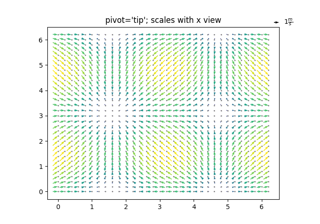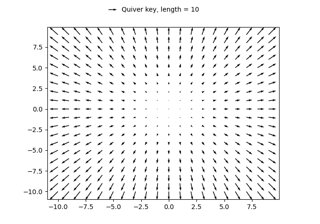matplotlib.axes.Axes.quiverkey#
- Axes.quiverkey(Q, X, Y, U, label, **kwargs)[source]#
Add a key to a quiver plot.
The positioning of the key depends on X, Y, coordinates, and labelpos. If labelpos is 'N' or 'S', X, Y give the position of the middle of the key arrow. If labelpos is 'E', X, Y positions the head, and if labelpos is 'W', X, Y positions the tail; in either of these two cases, X, Y is somewhere in the middle of the arrow+label key object.
- Parameters:
- Q
matplotlib.quiver.Quiver - X, Yfloat
The location of the key.
- Ufloat
The length of the key.
- labelstr
The key label (e.g., length and units of the key).
- anglefloat, default: 0
The angle of the key arrow, in degrees anti-clockwise from the x-axis.
- coordinates{'axes', 'figure', 'data', 'inches'}, default: 'axes'
Coordinate system and units for X, Y: 'axes' and 'figure' are normalized coordinate systems with (0, 0) in the lower left and (1, 1) in the upper right; 'data' are the axes data coordinates (used for the locations of the vectors in the quiver plot itself); 'inches' is position in the figure in inches, with (0, 0) at the lower left corner.
- colorcolor
Overrides face and edge colors from Q.
- labelpos{'N', 'S', 'E', 'W'}
Position the label above, below, to the right, to the left of the arrow, respectively.
- labelsepfloat, default: 0.1
Distance in inches between the arrow and the label.
- labelcolorcolor, default:
rcParams["text.color"](default:'black') Label color.
- fontpropertiesdict, optional
A dictionary with keyword arguments accepted by the
FontPropertiesinitializer: family, style, variant, size, weight.- **kwargs
Any additional keyword arguments are used to override vector properties taken from Q.
- Q
Examples using matplotlib.axes.Axes.quiverkey#
Advanced quiver and quiverkey functions

